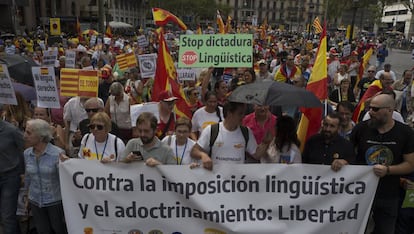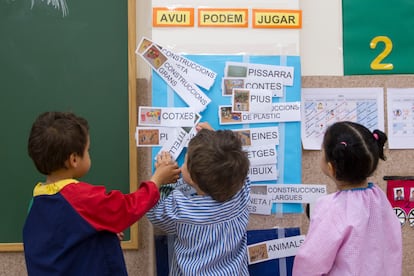Catalan government defies Supreme Court ruling on teaching more Spanish language at schools
Regional education chief defends the current immersion program and urges principals to ignore a decision that would mean delivering at least 25% of classes in the national tongue

The government of Catalonia has reacted defiantly to a decision by the Spanish Supreme Court that implies teaching more hours in the Spanish language in the region’s schools, where language immersion programs give preference to Catalan.
The Catalan government, which is run by a separatist coalition, has sent a letter to 5,108 school principals advising them not to change their linguistic programs despite the court’s decision. In the government’s opinion, Spain’s national education law, known as Lomloe, guarantees Catalonia’s right to continue teaching a majority of classes in the Catalan language.
“We want you to keep working exactly the same way you have until now,” said the letter sent on Wednesday by Catalan education chief Josep Gonzàlez-Cambray.
The move comes after the Spanish Supreme Court on Tuesday rejected an appeal by the Catalan government against an earlier ruling by the Catalan High Court forcing schools in the region to teach at least 25% of hours of education in the Spanish language.
The Spanish Education Ministry said it would not comment on the decision before its legal services had analyzed it, the news agency Europa Press reported. This latest move puts Spain’s central government in a delicate position, as the minority coalition led by Pedro Sánchez of the Socialist Party (PSOE) has frequently required support from Catalan separatist parties to get key legislation passed inside Spanish parliament, such as the budget.
The Catalan linguistic immersion program has been in place since 1983 despite several adverse rulings over the years by both the Supreme Court and the Constitutional Court. Under the system, the Catalan language is generally considered the “vehicular language,” or primary language of instruction, for all subject matter except the Spanish language class and foreign language classes.
The issue of language at school is a politically sensitive one that parties on the left and the right have sparred over for decades. Rosa Maria Villaró, of the labor union CC OO, lamented that things have reached this point. “Language should never have been judicialized and politicized like this,” she said. “This is not about language quotas but about powers over language policy.” Her union defends the current model, which it views as “a guarantee of social cohesion.” Iolanda Segura, the spokesperson for the education union Ustec, said that “the education model cannot be changed through rulings. We ask that it not be applied.”
This is not about language quotas but about powers over language policyRosa Maria Villaró, of the labor union CC OO
But the Supreme Court decision drew plaudits from the Assembly for a Bilingual School, a parent association that has taken legal action on several occasions to defend greater choice in the language of instruction for their children. “The end of linguistic immersion is here. We will not renounce our linguistic rights. It’s time to change the education model,” said the group in a statement. “Thousands of students in Catalonia are part of an education system that discriminates against them for language reasons. The Constitution guarantees their right to be schooled in the official languages of Catalonia.”
In practice, each school enjoys some latitude to create its own policy. Depending on the stage of education, there are typically between three and four hours of classes a week taught in the Spanish language. The Supreme Court ruling would push that up to slightly over six hours a week in primary school and seven-and-a-half hours a week in secondary and in Bachillerato, a pre-university program. This would be the minimum acceptable amount, although each school would be free to increase it.
The Supreme Court said that the Spanish Constitution guarantees the “vehicular” nature of the Spanish language. And in its own decision from December 2020, the Catalan High Court said that the use of Spanish at most Catalan schools is “residual,” noting that this is a violation of existing legal frameworks.

The Catalan education department does not impose a certain number of hours for each language, but makes Catalan “the language of reference,” while letting each school create its own linguistic programs. Some centers already teach more classes in Spanish than strictly required, either because the teacher chooses to do so or because school officials feel that a large number of students have a deficient knowledge of this language. Sometimes Spanish is used for activities that are not on the curriculum; Joan d’Àustria Secondary School in Barcelona uses Spanish for theater projects, poetry recitals and conference talks. And Les Corts Secondary School in Barcelona runs a student magazine in Spanish to help improve skills in that language.
Catalonia’s linguistic model is based on legislation from 1983 that made Catalan the “language of reference” for government agencies, regionally-owned media outlets, public signage and non-university education. For the latter, regional authorities found inspiration in the linguistic immersion program used at the time in the Canadian province of Quebec, which favored French over English.
Over the years, this model has found broad support inside the regional parliament from separatist and leftist parties. The education community has largely stood behind the system as well. A few families have turned to the courts in recent years to demand the right to have their children schooled in Spanish. Segura, the spokesperson for the education union Ustec, said that since 2005 only 80 families out of a school system with 1.5 million students have requested schooling in Spanish. “For 80 families to expect to change a model is outrageous and indecent,” she said.
Tu suscripción se está usando en otro dispositivo
¿Quieres añadir otro usuario a tu suscripción?
Si continúas leyendo en este dispositivo, no se podrá leer en el otro.
FlechaTu suscripción se está usando en otro dispositivo y solo puedes acceder a EL PAÍS desde un dispositivo a la vez.
Si quieres compartir tu cuenta, cambia tu suscripción a la modalidad Premium, así podrás añadir otro usuario. Cada uno accederá con su propia cuenta de email, lo que os permitirá personalizar vuestra experiencia en EL PAÍS.
¿Tienes una suscripción de empresa? Accede aquí para contratar más cuentas.
En el caso de no saber quién está usando tu cuenta, te recomendamos cambiar tu contraseña aquí.
Si decides continuar compartiendo tu cuenta, este mensaje se mostrará en tu dispositivo y en el de la otra persona que está usando tu cuenta de forma indefinida, afectando a tu experiencia de lectura. Puedes consultar aquí los términos y condiciones de la suscripción digital.








































